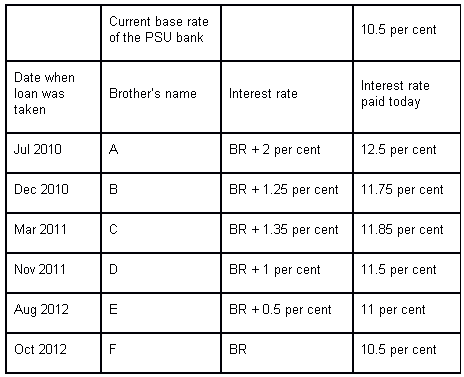Harsh Roongta
The main culprit is the lack of transparency that your lending bank of housing finance institute employs in determining home loan rates.
Your home loans will now cost less, screamed newspaper headlines after the RBI announced a cut in the cash reserve ratio recently. Obviously you hoped that your home loan lender was listening and would reduce your EMI burden soon.
In the next week your anticipation turned to delight as your lending bank announced a cut in home loan interest rates for the "festival season". You started planning for all the things that you will be able to buy from the money you save by way of reduction in EMI whose burden had increased manifold in the last few years.
You called up your good friend (who is knowledgeable in financial matters) to share the good news but he punctured your glee a bit by asking you whether your loan was from a bank or housing finance company. He knowingly informed you: see banks are governed by RBI who instituted the base rate system way back in July 2010 to make the floating rate system more transparent. You replied happily that your loan was indeed from a bank (and that too from a PSU bank) and not from a housing finance company. Now you are sitting back and eagerly awaiting the letter from your lender announcing the reduction in EMIs.
Unfortunately you wait may last forever. Here is how the cookie has crumbled on the base rate mechanism initiated with much fanfare in July 2010.
ApnaPaisa is India's leading Online market place for financial products such as loans, credit cards and insurance plans.
Why YOU are paying high EMIs on your home loan
Take the example of this large public sector bank. Let's say there are six twin brothers with the same income and working at the same company with the same qualifications and other assets and liabilities. The only difference is that the brothers bought their homes at different points of time in the same building and took the exact same loan amount of Rs 30 lakh from the same PSU bank.
Here is what they would be paying today (see the table).
As you can see from the table, even in a PSU bank, the earliest consumer (Brother A) is paying a penalty of a whopping 2 per cent per annum as compared to his Brother F who is paying only 10.5 per cent. In fact Brother E who took the loan just 45 days ago feels most cheated because he is paying a penalty of a massive 0.5 per cent per annum for committing the sin of becoming an consumer of the PSU bank just 45 day before his brother F.
Let me hasten to add that private sector counter parts as well as the housing finance companies are the same.
Why YOU are paying high EMIs on your home loan
Photographs: Rediff Archives
All the recent announcements from major banks for reduction in home loan rates disguised as "festival offers" have been by way of change in the spread with reference to base rate, which means only new consumers, benefit. The only major bank that has actually reduced base rate is SBI but please remember even SBI has announced several interest rate reductions by way of change in spreads in the last few months.
Clearly if RBI's intention was to make floating interest rates more transparent by introducing base rate mechanism it has not worked. National Housing Bank (NHB) which governs housing finance companies has also issued a circular banning differentiation between old and new consumers. It is yet to be seen what action NHB takes now that differentiation by HFCs between old and new consumers is a reality even after the circular was issued.
Why YOU are paying high EMIs on your home loan
Photographs: Rediff Archives
Both RBI and NHB have banned pre-payment charges on floating rate loans thus allowing at least the more aware consumers to change their lenders without paying a fee or to get the existing lenders to reduce the interest rate. In the current regulatory environment where the prevailing principle is "Buyer Beware" even this is a great step as it at least allows the aware consumers to get lower rates.
But if the regulators really want to make sure that existing consumers get a fair deal it is not very difficult to enforce the regulations. Firstly disallow any changes in the spread except due to a credit downgrade.
Make sure that each consumer account is rated (required anyways under the Capital Adequacy norms) and that any downward change in rating is compulsorily communicated to the consumer. Also the capital adequacy requirements should be calculated based on the rating used for pricing the loan, which means that higher capital will be required if this particular consumer rating is downgraded.
If followed with rigour this should solve the issue of differential treatment of old consumers as compared to new consumers without restricting the lenders ability to charge more if the consumer risk has increased.
While all this happens the bottom line for you is clear: Be vigilant or pay more. The choice is entirely yours.





Comment
article